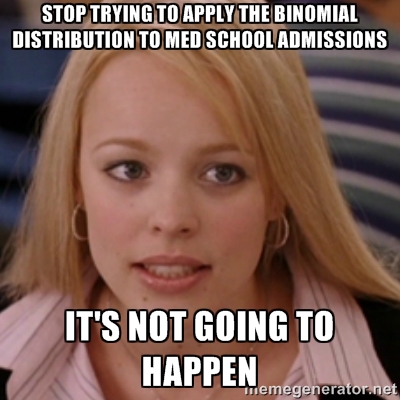- Joined
- Feb 10, 2014
- Messages
- 43
- Reaction score
- 32
I constantly see people on here saying that there is no component of randomness whatsoever when it comes to med school admissions. To say this means that you are sure, with absolute certainty, that if an applicant applied to 10,000 different schools 10,000 different times then their results would be exactly the same each time. This is clearly not the case, and it has been shown that in a similar problem, an interview situation where applicants are accepted or denied immediately following the interview, the best applicant is only chosen from the applicant pool at most 37% of the time. It is a higher percentage for med schools because they wait until they have about 20 applicants before deciding on them and then moving on to the next pool, but they don't decide on all applicants at once and thus they are subject to this famous problem.
http://en.wikipedia.org/wiki/Secretary_problem
This means that medical school admission acceptance is a random variable, much like a coin flip. This is mainly because medschools often review around 20-40 people at once, and so it is random which group you get placed in and thus medschool admissions does have a "lottery" component to it. This means that it is better to apply to more schools. Edited for conciseness.
http://en.wikipedia.org/wiki/Secretary_problem
This means that medical school admission acceptance is a random variable, much like a coin flip. This is mainly because medschools often review around 20-40 people at once, and so it is random which group you get placed in and thus medschool admissions does have a "lottery" component to it. This means that it is better to apply to more schools. Edited for conciseness.
Last edited:




